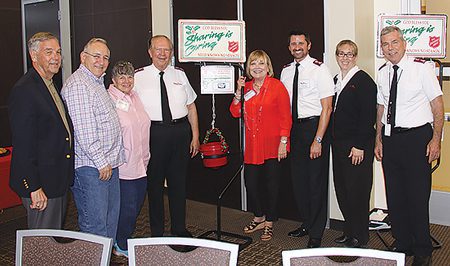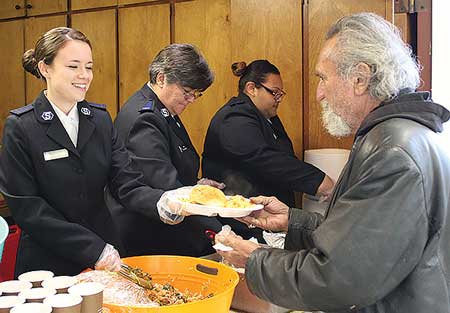West eyes more interaction with inmates.
By Jared McKiernan
The Salvation Army Western Territory is working to retool and revamp its agenda for prison ministry amid record-high rates of incarceration in the U.S.
Sparked by the recent appointment of Major Tom Ford, the department—formerly extension studies—assumed the title of Corrections and unveiled a strategic plan detailing an expanded, comprehensive approach to prison ministry.
Ford was appointed as secretary of corrections, a position that had been vacant 20 years. The appointment transpired, Ford said, partially due to an increased need for comprehensive services for the incarcerated population. The U.S. has had the highest incarceration rate in the world since 2002, according to the Bureau of Justice Statistics. In 2010, the U.S. rate was 500 prisoners per 100,000 residents, or about 1.6 million prisoners.
“The department is expanding,” Ford said. “It’s not just extension studies anymore. Now, it’s corrections.”
Prior to Ford’s arrival, the department focused primarily on administering The Salvation Army’s Bible Correspondence Courses, its flagship service to inmates. It will continue to send the mail-in courses, while developing an array of other resources for inmates. Raising awareness of the department’s work is step one, Ford said. The introduction of a department newsletter and monthly conference calls with the other U.S. territories figure to amplify communication among those involved in prison ministry.
Through a partnership with the West’s multimedia department, the corrections department is also working to produce training videos that will be made available to any corps demonstrating how to grade a Bible Correspondence Course as well as best practices for entering a jail or prison for ministry. The department will release another video for use as a recruiting tool, showing how The Salvation Army helps “divert” those prone to incarceration.
“We are getting a response from corps that never knew this ministry was available and requesting more info on how they can be involved,” Ford said.
Ford looks to fixate correctional ministry on four of the biggest challenges confronting inmates: life skills, addiction, relationships and spiritual formation. Since the Bible Correspondence Courses are geared toward spiritual formation, many of the new developments align with the other three.
“We realized the courses have a purpose,” said Bob Zerhusen, assistant to the director, “but if that’s all we’re doing, that’s not enough. The courses were helpful with spiritual development, but if you do our courses then get released but you have no idea how to do a job interview, then you’re in trouble.”
Corrections is developing a series of worksheets for corps to use in one-on-one settings with inmates. The worksheets are designed to help inmates track their progress in each of these areas before and after release. Upon release, chaplains then connect inmates with other support services offered by The Salvation Army. The sooner chaplains can begin building relationships with inmates, the better, Ford said.
“Trust is a big criminogenic issue,” Ford said. “If [inmates] know you in prison, they’re more likely to want to keep working with you once they get out.”
Envoy Roy Snapp-Kolas, director of urban ministry for The Salvation Army Southern California Division, recently began facilitating the Bible Correspondence Courses face-to-face to inmates at the Men’s Central Jail in downtown Los Angeles––another outreach the department would like to see mimicked throughout the territory.
“The face-to-face encounters allow me to encourage the guys to keep pursuing this and allow for more immediate feedback on the information that they have put down,” Snapp-Kolas said. “Hopefully, out of that some relationships will develop that might extend beyond someone’s period of incarceration.”
“[Snapp-Kolas] is kind of a model of what we would like to do,” Zerhusen said. “If we can support the chaplain we have a direct relationship with inmates that way.”
Rather than focusing solely on the incarcerated, Ford hopes to provide the families of inmates a similar lifeline. A partnership with Child Evangelism Fellowship that would offer Bible lessons to the children of inmates is also in the works.
Bertha Salguero, Spanish coordinator, is working to adapt the new crop of initiatives for Spanish corps in the territory. She said she is excited to be able to reach so many more inmates and families.
“It means we’re going to be growing,” Salguero said. “I feel like we were stuck on sort of a plateau for a while so this is a good boost for us. … A lot of [inmates] ask for visitation and up until now we didn’t have anything to offer.”
Snapp-Kolas expects a heavier emphasis on post-release mentoring to play a key role in decreasing recidivism.
“I most desire that there be linkages between the jails and our Salvation Army programs—whether it be residential programs or even corps ministries—so that when someone is discharged, they can connect with those environments that are positive and pointing them to reintegration into society.”















